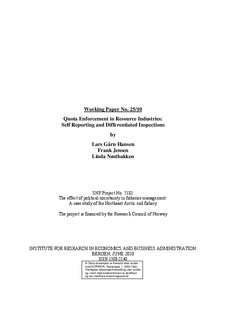| dc.contributor.author | Hansen, Lars Gårn | |
| dc.contributor.author | Jensen, Frank | |
| dc.contributor.author | Nøstbakken, Linda | |
| dc.date.accessioned | 2010-10-19T11:44:52Z | |
| dc.date.available | 2010-10-19T11:44:52Z | |
| dc.date.issued | 2010-06 | |
| dc.identifier.issn | 1503-2140 | |
| dc.identifier.uri | http://hdl.handle.net/11250/166298 | |
| dc.description.abstract | Individual quotas are a dominant instrument in the management of common pool renewable resources like fisheries. However, there is concern about the basic effectiveness of quota regulation due to widespread non-compliance. In this paper we develop a model of enforcement in a quota regulated renewable resource industry and consider a case with significant non-compliance, and with exogenous constraints on fines and enforcement budget. We propose a reform of the enforcement system by introducing self reporting of excess extraction and (explicit) differentiation of inspection rates based on compliance history. We show that the proposed reform increases the effectiveness of quota management and allows the regulator to implement a wider range of aggregate extraction targets than under the traditional enforcement system. This is shown without violating the inspection budget constraint or the fine constraint, and while ensuring an efficient allocation of aggregate catch. | en |
| dc.language.iso | eng | en |
| dc.publisher | SNF | en |
| dc.relation.ispartofseries | Working paper | en |
| dc.relation.ispartofseries | 2010:25 | en |
| dc.subject | non-compilance | en |
| dc.subject | self reporting | en |
| dc.subject | enforcement | en |
| dc.subject | quota regulation | en |
| dc.subject | fishery | en |
| dc.title | Quota enforcement in resource industries : self reporting and differentiated inspections | en |
| dc.type | Working paper | en |
